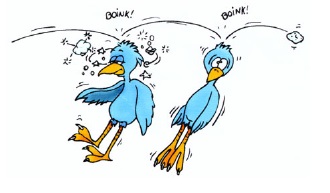An idiom is an expression or phrase that is grammatical and natural to English native speakers. Its meaning as a group of words cannot be deduced from the meaning of its individual parts. Idioms are very common and useful in English. They are difficult to translate.
Here you have a couple of examples, which have a direct Spanish translation:
To kill two birds with one stone ~ Matar dos pájaros de un tiro [literalmente, "con una piedra"].
Don't look a gift horse in the mouth ~ A caballo regalado no se le miran los dientes.
However, most idioms do not have a direct translation into Spanish. In most of these cases, they correspond to another idiom in Spanish:
Like two peas in a pod ~ Como dos gotas de agua [no obstante, traducido literalmente, significa: "Como dos guisantes en una vaina"].
When in Rome do as the Romans do ~ Donde fueras, haz lo que vieras [aunque su traducción literal significa: "Cuando en Roma, haz como los romanos"].
Now, it is time to study some more idioms! I have divided them into four topics (weather, health, work and money) and I am including a definition or explanation of its meaning.
WEATHER IDIOMS
It is raining cats and dogs ~ Llueve a cántaros [pero, literalmente, significa: "Están lloviendo gatos y perros"]. When it rains very heavily.
Face like thunder ~ Está que truena [la traducción directa sería: "cara de trueno"]. Being clearly very angry or upset.
HEALTH IDIOMS
An apple a day, keeps the doctor away [su traducción literal reza: "una manzana al día mantiene al doctor alejado"]. Apples are so nutritious that if you eat one every day, you will not ever need to go to a doctor.
To be full of beans [traducido directamente sería "estar lleno de frijoles"]. If you are full of beans, you are a lively, active and healthy person.
WORK IDIOMS
The early bird catches the warm ~ A quien madruga Dios lo ayuda [literalmente, "el pájaro madrugador agarra el gusano"]. Good things and success come to those who prepare well and put in effort.
To bring home the bacon ~ Traer el pan a casa [aunque la traducción directa sería "el bacon o panceta"]. To earn a living, to have a salary; to bring home money earned at a job.
MONEY IDIOMS
A penny saved is a penny earned. [literalmente, "un centavo ahorrado es un centavo ganado"]. It is useful to put aside money that you already have as it implies earning more. Thus, it is good to save up money!
To cost an arm and a leg ~ Costar un riñón o un ojo de la cara [la traducción directa sería "un brazo y una pierna"]. To be very expensive.
Let's practice with some sentences... BREAK A LEG! (An idiom that means "good luck!", but which literally means "rompe una pierna").
1. My grandmother is getting old, but she is still ______________________________ .
2. - Was your new computer cheap?
- Not at all! It ______________________________ !
3. Today's weather is crazy... I'm soaked. It's been ______________________________ all day!
4. - Are Arturo and his brother twins?
- No, but they are ______________________________ .
5. Anna, if you see a job that interests you, apply as soon as possible. ______________________________ .
And remember.... It's better late than ever... [Más vale tarde que nunca].
Answer Key [ánserki]: 1. full of beans. 2. cost (me) an arm and a leg! 3. raining cats and dogs. 4. like two peas in a pod. 5. The early bird catches the worm.
La Voz, Cultura y noticias hispanas del Valle de Hudson
Comments | |
|
Comentario: Parece muy util este recurso. Thanks for sharing! Posted: 9/2/2014 |
|


